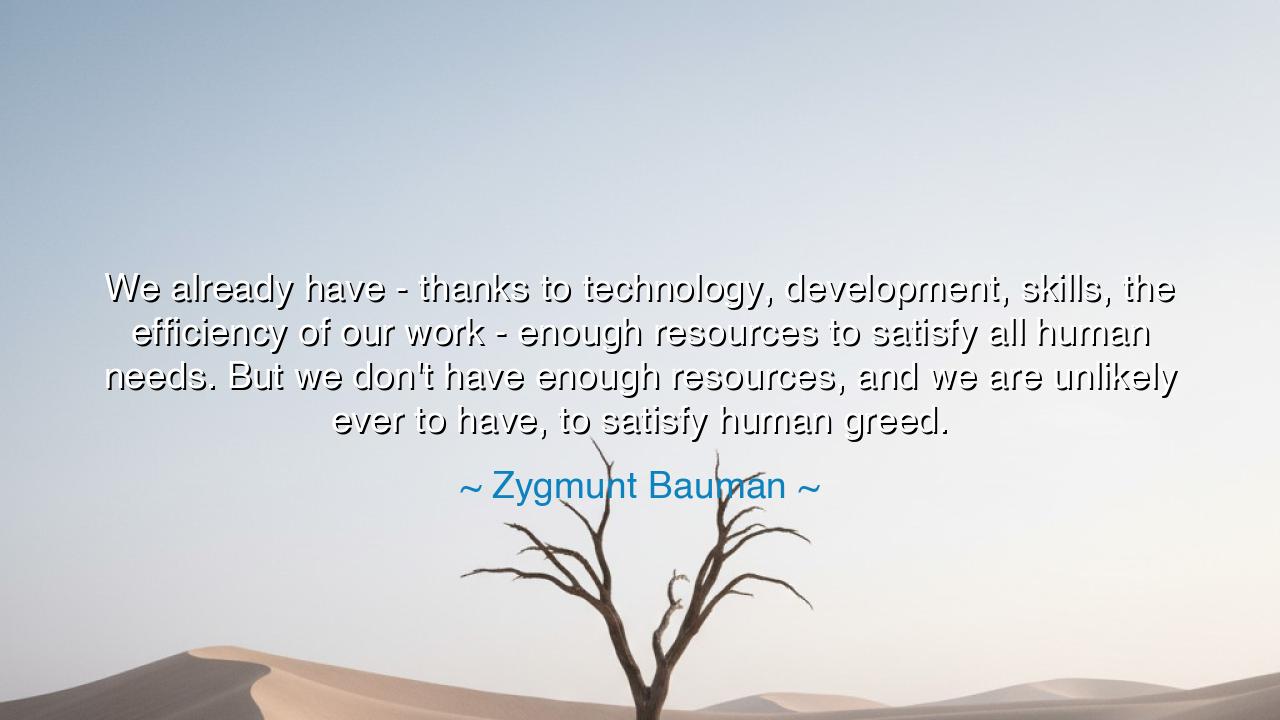
We already have - thanks to technology, development, skills, the
We already have - thanks to technology, development, skills, the efficiency of our work - enough resources to satisfy all human needs. But we don't have enough resources, and we are unlikely ever to have, to satisfy human greed.






Hear the words of Zygmunt Bauman, sage of the modern age, who pierced through the illusions of progress and declared: “We already have—thanks to technology, development, skills, the efficiency of our work—enough resources to satisfy all human needs. But we don’t have enough resources, and we are unlikely ever to have, to satisfy human greed.” This is not the speech of despair, but of awakening. For he reminds us that the world is rich, and the earth yields abundantly, yet it is not scarcity that torments mankind—it is the endless hunger of greed.
The origin of this truth is found in the history of human striving. In ancient times, men feared famine and drought, and survival seemed forever uncertain. But in our age, through technology, through development, through the skill of countless hands and the efficiency of industry, humanity has gathered more food, more knowledge, and more wealth than the ancients ever dreamed. Hunger is no longer born of nature’s limits but of man’s injustice. The earth provides enough for all to live; it is the bottomless pit of greed that devours the plenty.
Consider the tale of the Roman Empire, swollen with riches drawn from every land it conquered. Grain poured in from Egypt, treasures from the East, slaves from every shore. Yet even with such abundance, inequality reigned. The masses crowded in poverty while the elites feasted in marble halls. Bread and circuses were tossed to the people, but the lion’s share was consumed by those whose appetites knew no end. Here we see Bauman’s truth carved into history: resources suffice for needs, but never for greed.
The same can be seen in the modern age. Nations waste mountains of food while children starve in distant lands. Technology makes work faster, more efficient, more productive than ever before, yet wealth piles high in the hands of the few. The problem is not the lack of resources, but the excess of desire. As Gandhi once echoed, “The world has enough for everyone’s need, but not enough for everyone’s greed.” Bauman’s voice joins this ancient chorus, reminding us that the heart, not the earth, is the true battlefield.
The meaning of this quote, then, is both warning and call to virtue. Need is finite—it can be satisfied with bread, with shelter, with care. Greed, however, is infinite, for it seeks not satisfaction but domination, not sufficiency but excess. To chase it is to chase a mirage in the desert: the closer you come, the further it recedes. A society that bows to greed will never know peace, for its hunger will consume itself and all around it.
What lesson, then, must the children of tomorrow take? It is this: measure your life by needs, not by greed. Take what sustains you, but do not hoard what robs another. Recognize that abundance is already here, if only it were shared with justice. Learn to quiet the restless craving for more, and instead cultivate gratitude for enough. For the one who is content is richer than the one who possesses empires.
Therefore, let your actions be thus: resist the temptation to equate happiness with possession. Practice generosity, that the plenty of the world may flow where it is most needed. Support systems that distribute fairly, rather than feed the engines of endless consumption. And above all, teach your heart to be still, knowing that true wealth lies not in the conquest of more, but in the contentment of enough. For Bauman’s wisdom endures: the world can satisfy every need, but never the boundless hunger of greed.






AAdministratorAdministrator
Welcome, honored guests. Please leave a comment, we will respond soon